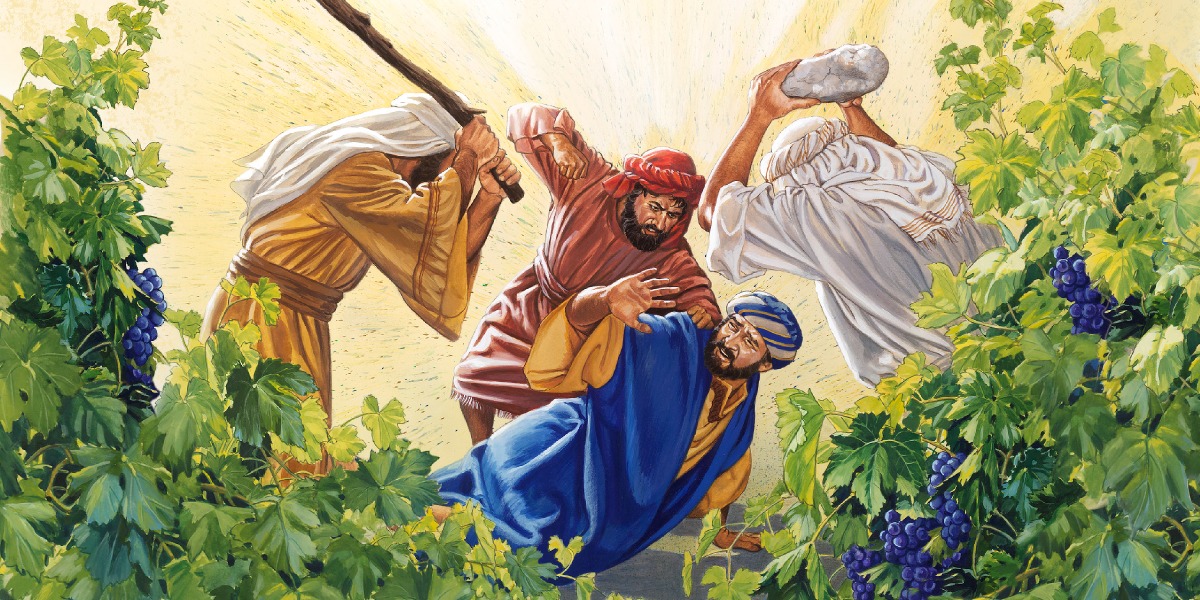
For a third week in a row we have a parable about a vineyard. Each one of these parables has been directed against the Jewish Priests, Elders, Scribes and Pharisees who reject Jesus. Like the hired workers in the vineyard, they were envious of His divine generosity. Like the disobedient son of his Father, they professed themselves ready to do God’s will, but in fact they didn’t. And like the vineyard tenants, having rejected and murdered God’s servants the prophets, they were now planning to kill his only Son.
When you were growing up, did your parents ever have to take anything away from you because you didn’t look after it? If so, you can understand what Jesus is talking about in the parable of the wicked tenants. It is a parable of God’s kingdom on earth. Specifically, God is the landowner, the people who reject Jesus or do not care about him are the tenants, the Old Testament prophets are the slaves sent by the landowner, and Jesus is the landowner’s son. God gave the kingdom to the Israelites to tend and do his work, but they rejected their duties and turned away from God. In return, he sent the Old Testament prophets to warn them, but the Israelites rejected the prophets. Finally, God sent his son Jesus to warn them, but he was also rejected and crucified.
The parable of the wicked tenants represents our broken relationship with God, his attempts to repair it, and mankind’s rejection of his attempts. In spite of our continual rejection of him, God never gives up on us. His love for us never diminishes. He never stops sending us messengers.
But we too silence the messengers of God sent to us, especially when they tell us unpleasant things about our lives— that we are phonies— that what we are doing is not right. We all have those people who come to us and are honest with us about things which are imperfect in our lives.
The prophet of God in our lives is not usually a Bishop, Priest, or Deacon. Rather, the messengers of God to us are usually much closer and nearer, like a wife, a husband, a child, a parent, a dear and close friend who have the willingness to be honest with us.
My messenger from God is most often my wife. She tells it like it is about me. She actually tells me that this is her God given gift, to notice the flaws and imperfections of my personality and to point them out. I often grumble and groan inside when she reminds me that I am acting like a spoiled child, and that I am insisting on my own way. Yes, way too often, my wife is my personal messenger from God, God’s angel, God’s prophet for me.
And deep down inside, we often want to silence the honesty of God’s messenger to us. We are like the Pharisees in that we want to silence the voices of the messengers of God to us.
This theme is part of Jesus’ parable. The question is: how have you and I been silencing the messengers of God to our lives?
The fundamental problem for the Pharisees is that they were not producing the fruit of virtue. They were not living lives of goodness, kindness, gentleness and compassion for those in need. The Pharisees were self centered and more concerned about their religious status and income than about the needs of others.
God gave us life. God has the vineyard. The vineyard is God’s. God created this world in which we live. And God expects rent from us as a payment for living in his vineyard. It is pretty simple. God expects the rent. And what is the rent that God wants from us? A life of love, kindness and compassion. What is the payment? To love God with all your heart, mind and soul and your neighbor as yourself —- That is the rent. These are the fruits of virtue. The Pharisees were not willing to pay the rent that God wanted and demanded from them for living in God’s vineyard.
God wants you and me to pay the rent also. God wants us to have righteous fruit growing in our lives. The invitation in the parable is for us to pay the rent to the owner of the vineyard, God. Again, the payment that God wants from us is to live a morally righteous life that loves God with all our heart and our neighbours as ourselves.
In the parable today, we can hear the voice of condemnation and punishment. That is, God will kill the unresponsive renters and find others. Or we can hear the voice of God today within this parable when God says to you and I in this moment: “Listen to the voices of my messengers that I send into your life.”
The task isn’t ours alone to complete. God has invested care and concern for the work we do in his vineyard, and in the end, God’s ways are what we are trying to accomplish. We must remember that we are only tenants, and the full responsibility for the success of our work is not only ours.
Giving grows out of loving, and loving comes from God. We know love because God first loved us. We have known love and so we love others in return. Giving is our response to God’s love, and our giving makes things happen. In fact, it is only a week until we celebrate Thanksgiving—a time to give thanks to God for all he has given us—– including the opportunity to bear good fruit for him. We are to be thankful for the portion of worldly things that God has given us, be contented with what we have, and trust God to provide for the future.
– Deacon Terry Murphy

